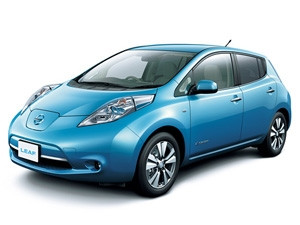
Eskom on Tuesday received 10 Nissan Leaf all-electric cars as part of its research project to study the charging requirements and characteristics of electric vehicles, and to prepare for their entry into the South African market.
The Leaf electric vehicles will be managed by Avis as part of its fleet, with Eskom's research to be conducted over a period of three years. The Leaf will be officially released in SA later this year.
The Leaf is already available in many countries, including the US, Canada, Japan and almost 20 European countries. Media relations manager for Nissan SA, Veralda Schmidt, says the launch of vehicles is a scientific process, done through the company's global product planning engineering department.
"With electric vehicles, the process is even more complex. Nissan is a vehicle manufacturer and distributor, and [the development of] infrastructure to support electric vehicles rests with departments such as environmental affairs, trade and industry, etc. Once the infrastructure is in place, a vehicle can be brought to market," she adds.
Through its research, Eskom will seek to understand what electricity infrastructure is required and how such infrastructure is likely to be used before electric cars become widely-used in SA.
The energy provider has already installed charging stations at its head office, Megawatt Park, in Sunninghill, and at its research facility in Rosherville, in Germiston. Several portable charging stations will be moved with the vehicles to enable participants to charge vehicles at home.
Eskom GM for research testing and development, Barry MacColl, says Eskom has been committed to electric vehicle research for about 10 years. "It's just recently that battery technology and drive technology have gotten to a point where range is sufficient and the pricing has come down to a point which makes this a viable competitor to the petrol car."
He adds that Eskom is working closely with the Technology Innovation Agency (TIA) and the Department of Environmental Affairs on e-mobility, and aims to understand the impact of electric cars in SA and whether local manufacturers can produce certain facets of the car.
MacColl says Eskom, however, doesn't foresee a massive uptake of electric cars in the next few years. "We see the gradual increase in demand, but we want to be sure that we are ready for it when it happens."
Eskom will also give feedback on a monthly basis, and MacColl says the research would be focused on charging and usage patterns. "It's really important for Eskom to know how people will use these vehicles, what time of day they will plug them in, and for how long they will charge. That has a large impact on our electric grid and we need to understand that so that we can be ready for it."
He adds that the research will also look at the storage of energy. "The Leaf does have a fairly large battery, and we want to research how the battery can be used by the consumer and by Eskom to charge during certain times of the day and to manage the demands of supply balance.
"Another area of interest to us is whether there is a possibility of an electric vehicle tariff. We don't have one at the moment in the country and there isn't one on the table yet, but this research will help us find possibilities that will encourage people to use electric vehicles and encourage them to charge during certain times of the day."
Greener
The Leaf is powered by a lithium-ion battery that offers a range of up to 160km on a single charge and delivers a top speed of up to 145km/h.
Nissan SA MD Mike Whitfield says it is completely environment-friendly as it produces zero emissions. "This is something we believe will make the vehicle attractive to fleet owners, particularly local subsidiaries of international companies that report on carbon emissions."
He adds that it is also a viable alternative for companies looking for vehicles to operate in a congested urban environment, with high stop-start operating and idling costs, and where range is not a factor.
Looking at SA's electricity infrastructure, MacColl says the Nissan Leaf has a 24kWh lithium-ion battery, which can be charged through a normal five amp plug and it takes eight hours to completely charge the vehicle.
"We believe that most people will use the vehicle during the day, bring it home in the evening and charge it overnight for that eight-hour period. And that draws 15 amps, which is a typical plug point in a house and won't pose too much of problem to the electricity grid," he notes.
Forgotten Joule
SA has tried its hand at the electric vehicle before, but did not succeed. The company behind the local electric car, the Joule, officially closed its doors in June last year.
Optimal Energy announced the shelving of Joule in April, after seven years and a R300 million investment - and despite trying to refocus its efforts on electric buses - it finally had to cut its losses and shut down.
The company battled to secure the R9 billion in funding needed to commercialise the Joule. Optimal Energy received strong initial backing from government, with the Department of Science and Technology, the TIA and the Industrial Development Corporation, making combined investments of around R300 million, and holding 30% and 50% of the company, respectively.
Share